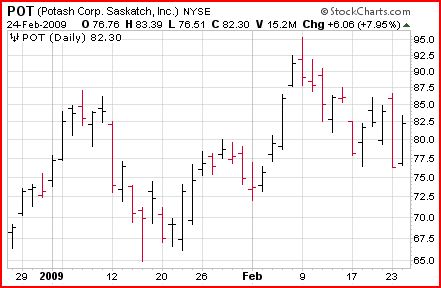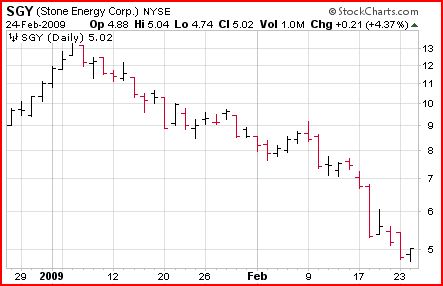NOTE: This post is part of an ongoing education series. This information is for educational purposes only. This information does not constitute investment advice. No rational person would make investment decisions based on a blog post. Please consult with your financial advisor before taking any action. Diversification is one of the most important things you can do to reduce the risk in your portfolio. If you have all of your money in one stock in could go up 100% or lose 100% . If you owned Enron or Kmart you could have lost all of your money. Risk can be measured mathematically and it is called volatility. This is an image of a stock with high volatility.

Below is a picture of stock with low volatility. In this example, the stock went down. Volatility is not related to the direction of the stock price but to the rate of change (up and down) in the price. More movement equals more volatility which is said to be more risk.

If you own only one stock you could get a big surprise if the company does not make its expected revenue numbers. If you own more stocks, the effect of one stock becomes much smaller. The idea is that while some stock go up - some go down but on average they go up with much less volatility.
From Wikipedia...
In 1977 Elton and Gruber worked out an empirical example of the gains from diversification. Their approach was to consider a population of 3290 securities available for possible inclusion in a portfolio, and to consider the average risk over all possible randomly chosen n-asset portfolios with equal amounts held in each included asset, for various values of n. Their results are summarized in the following table. It can be seen that most of the gains from diversification come for n≤30.
Number of Stocks in Portfolio Average Standard Deviation of Annual Portfolio Returns Ratio of Portfolio Standard Deviation to Standard Deviation of a Single Stock 1 49.24% 1.00 2 37.36 0.76 4 29.69 0.60 6 26.64 0.54 8 24.98 0.51 10 23.93 0.49 20 21.68 0.44 30 20.87 0.42 40 20.46 0.42 50 20.20 0.41 400 19.29 0.39 500 19.27 0.39 1000 19.21 0.39
The Important thing to see is that 1 stock has a volatility of 100% and 30 stocks have a volatility of 42% (of one stock). With more stocks you dramatically decrease the volatility / risk.
Most investors do not have the funds to buy stock in 30 different companies. Just $5,000 per company would take $150,000 plus all of the fees involved to make the trades. What you can do, is buy a diversified stock mutual fund or even better - an index fund.
